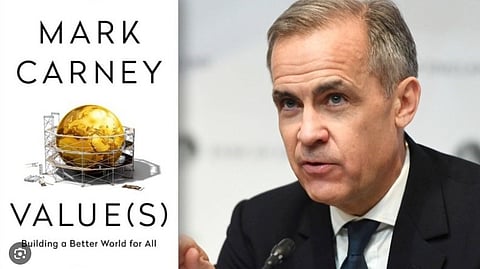

Mark Carney is not the man to answer a crisis, but he soon may create one.
If you read Carney’s 2021 release 'Value(s): Building a Better World for All,' it becomes abundantly clear he’s advocating for a monumental shift in Canada and not stability, “I wrote Value(s) because I believed, even before COVID struck, that we needed radical changes to build a better world for all.”
Radical changes are destabilizing, of course.
Carney is all too aware that his net-zero ideology, explained at length in Value(s), means a high degree of instability in the present. For example, look at how the European Union (EU) — which aims to be climate-neutral by 2050 — still struggles to end its Russian oil dependence as it phases out its own oil and gas. The EU continues to be energy reliant on a country that may well have inclinations of annexation against them.
Phasing out oil and gas. Dependency on foreign energy. Weakness against hostile nations.
Does Carney want these things for Canada?
That’s where he’s pushing us though, aiming to complete what Trudeau started with Bill C-69.
Despite his 2021 catechism on net zero ideology, which requires Canadians sacrifice now, Carney’s paradoxically campaigning on a promise of stabilizing Canada in the wake of Trump’s tariffs. His methods to address those tariffs are thus far in serious question, even by other technocrats.
Although economists suggest nobody wins in a so-called tariff war, Carney has taken the bait and promises to “respond with both purpose and force.”
How can he today promise things like rapidly building the strongest economy in the G7 while he engages in a tariff war and his net-zero ideology asks us to make further sacrifices? “If we value the present much more than the future,” he cautions in Value(s), “then we’re less likely to make the investments today to reduce risks tomorrow.”
What about today’s risk?
Is Carney going to address economic instability now, or is he going to pivot Canada whole hog to net-zero, which will introduce massive instability like it did in the EU?
These approaches are clearly contradictory and could lead to economic collapse.
In his book, instead of present concerns like our economy or threats to Canadian sovereignty, Carney prioritizes what he refers to as “tragedies of the horizon” like the pandemic and climate change. These are reasons, he suggests, that we must endure instability in the present.
Here’s a thought: what if we end up with no horizon on which to have a tragedy?
Like Thomas Malthus, Carney uses fear of the future — future pandemics and global warming — as the driver to change our current values. Carney believes capitalism creates, “a crisis of values in which the values of the market are usurping the values of humanity.” He doesn’t believe in GDP per capita as an accurate measure for the standard of living. He sees free market capitalism, like he does oil and gas, as destined for the dustbin of history.
This all meshes concerningly well with the question Chrystia Freeland posed to students at Boston’s Northeastern University in 2023, “Does capitalist democracy still work?”
Wait.
How did the word “democracy” sneak in there?
The problem here is not just that Carney seeks to undermine the capitalist system with a new impetus for redistribution of wealth, but — once in power — he will do so with as little input from the people and politicians as possible. Undemocratically. He wants you to either become a net-zero disciple or get out of the way.
You and the voting public are an inconvenience.
“Net zero is now the organizing principle for the world’s largest companies and the core of the global financial system,” he crowed in Value(s).
Too bad then that last year more than 200 high profile companies (including Microsoft , Unilever , Procter & Gamble and Walmart) were delisted from their net-zero commitments because they simply couldn’t meet such ideologically-based, impractical targets. Four of Canada’s biggest banks and six from the US likewise made the decision to ditch Carney and the United Nation’s Net-Zero Banking Alliance.
Carney can’t have it both ways. Either he’s prioritizing the world and net-zero, or he’s prioritizing Canada and our economy.
Which is it?
